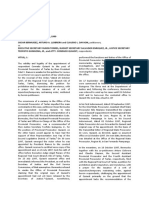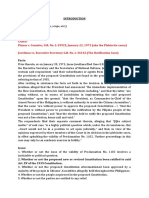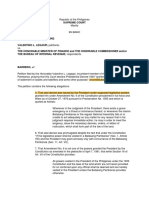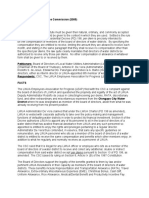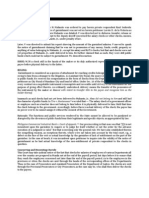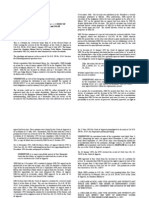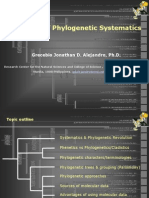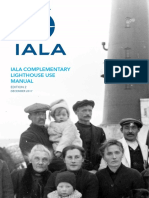NAC Vs COA
NAC Vs COA
Uploaded by
abi_robeniolCopyright:
Available Formats
NAC Vs COA
NAC Vs COA
Uploaded by
abi_robeniolOriginal Description:
Original Title
Copyright
Available Formats
Share this document
Did you find this document useful?
Is this content inappropriate?
Copyright:
Available Formats
NAC Vs COA
NAC Vs COA
Uploaded by
abi_robeniolCopyright:
Available Formats
National Amnesty Commission vs COA Facts: 1. National Amnesty is task to review Amnesty Applications. 2.
3 Ex Officio members eventually delegated their responsibility as members to various representatives, who were then paid honoraria. 3. NAC resident auditor Eulalia disallowed on audit the payment of honoraria to these representatives amounting to P255,750 for the period December 12, 1994 to June 27, 1997, pursuant to COA Memorandum No. 97-038. 4. Subsequently, NAC passed Administrative Order No.2 wherein Section 1 allowed the ex officio members to designate a representative, which in turn was entitled to allowances and benefits as authorised by law. 5. Thus, Petitioner invoked Administrative Order No. 2 before the COA assailing the ruling of NAC Auditor in disallowing payment to the representatives of the ex officio members, but to no avail. 6. Hence, on March 14, 2003, the NAC filed the present petition, contending that the COA committed grave abuse of discretion in disallowing payment of honoraria for various reasons. Ruling: 1. We hold that the position of petitioner NAC is against the law and jurisprudence. The COA is correct that there is no legal basis to grant per diem, honoraria or any allowance whatsoever to the NAC ex officio members' official representatives. 2. The Constitution mandates the Commission on Audit to ensure that the funds and properties of the government are validly, efficiently and conscientiously used. Thus, Article IX-D of the Constitution ordains the COA to exercise exclusive and broad auditing powers over all government entities or trustees, without any exception 3. COA Issued Memorandum 97-038, where in it caused the disallowance of any payment of any form of additional compensation or remuneration to cabinet secretaries, their deputies and assistants, or their representatives, in violation of the rule on multiple positions, and to effect the refund of any and all such additional compensation given to and received by the officials concerned, or their representatives, from the time of the finality of the Supreme Court ruling in Civil Liberties Union v. Executive Secretaryto the present. 4. Contrary to petitioner's claim, COA Memorandum No. 97-038 does not need, for validity and effectivity, the publication required by Article 2 of the Civil Code 5. COA Memorandum No. 97-038 is merely an internal and interpretative regulation or letter of instruction which does not need publication to be effective and valid.
NATIONAL AMNESTY COMMISSION, Petitioner, v. COMMISSION ON AUDIT, JUANITO G. ESPINO, Director IV, NCR, Commission on Audit, and ERNESTO C. EULALIA, Resident Auditor, National Amnesty Commission. Respondents. G. R. No. 156982 : September 8, 2004 Facts: Petitioner National Amnesty Commission (NAC) is a government agency created on March 25, 1994 by then President Fidel V. Ramos through Proclamation No. 347.The NAC is tasked to receive, process and review amnesty applications. It is composed of seven members: a Chairperson, three regular members appointed by the President, and the Secretaries of Justice, National Defense and Interior and Local Government as ex officio members.6 It appears that after personally attending the initial NAC meetings, the three ex officio members turned over said responsibility to their representatives who were paid honoraria beginning December 12, 1994.However, on October 15, 1997, NAC resident auditor Eulalia disallowed on audit the payment of honoraria to these representatives amounting to P255,750 for the period December 12, 1994 to June 27, 1997, pursuant to COA Memorandum No. 97038. On September 1, 1998, the NGAO upheld the auditors order and notices of disallowance were subsequently issued Issue: COA Memo No. 97-038 was not published, valid? Ruling: Contrary to petitioners claim, COA Memorandum No.97-038 does not need, for validity and effectivity, the publication required by Article 2 of the Civil Code: Art. 2.Laws shall take effect after fifteen days following the completion of their publication in the Official Gazette, unless it is otherwise provided. This Code shall take effect one year after such publication. We clarified this publication requirement in Taada vs. Tuvera:10 [A]ll statutes, including those of local application and private laws, shall be published as a condition for their effectivity, which shall begin fifteen days after publication unless a different effectivity date is fixed by the legislature. Covered by this rule are presidential decrees and executive orders promulgated by the President in the exercise of legislative powers whenever the same are validly delegated by the legislature or, at present, directly conferred by the Constitution. Administrative rules and regulations must also be published if their purpose is to enforce or implement existing law pursuant to a valid delegation. Interpretative regulations and those merely internal in nature, that is, regulating only the personnel of the administrative agency and not the public, need not be published.Neither is publication required of the so-called letters of instructions issued by administrative superiors concerning the rules or guidelines to be followed by their subordinates in the performance of their duties. (Emphasis supplied.) COA Memorandum No. 97-038 is merely an internal and interpretative regulation or letter of instruction which does not need publication to be effective and valid. It is not an implementing rule or regulation of a statute but a directive issued by the COA to its auditors to enforce the self-executing prohibition imposed by Section 13, Article VII of the Constitution on the President and his official family, their deputies and assistants, or their representatives from holding multiple offices and receiving double compensation.
You might also like
- FREDERICKS AND ANOTHER V STELLENBOSCH DIVISIONAL COUNCIL 1977 (3) SA 113 (C)Document3 pagesFREDERICKS AND ANOTHER V STELLENBOSCH DIVISIONAL COUNCIL 1977 (3) SA 113 (C)Naume100% (1)
- Garcia Vs MataDocument10 pagesGarcia Vs MataRachelle DomingoNo ratings yet
- CLU Vs EXECUTIVE SECRETARYDocument2 pagesCLU Vs EXECUTIVE SECRETARYAdrian Gabriel S. Atienza100% (1)
- Case Digest: Macias vs. Comelec, 32 Scra 1 G.R. No. L-18684, September 14, 1961 FactsDocument1 pageCase Digest: Macias vs. Comelec, 32 Scra 1 G.R. No. L-18684, September 14, 1961 Factssenpai FATKiDNo ratings yet
- Statcon NotesDocument35 pagesStatcon NotesAliNo ratings yet
- Tamil Nadu Stamp (Increase of Duties) Act, 1962Document6 pagesTamil Nadu Stamp (Increase of Duties) Act, 1962Latest Laws TeamNo ratings yet
- 402 How I Was Able To Hear The Desteni MessageDocument258 pages402 How I Was Able To Hear The Desteni MessageTheOwlReadsNo ratings yet
- Eric X. Li A Tale of Two Political SystemsDocument9 pagesEric X. Li A Tale of Two Political SystemsxiazaibichengNo ratings yet
- NAC V COA Case DigestDocument3 pagesNAC V COA Case DigestArlene Q. Samante100% (1)
- National Amnesty Commission vs. Commission On Audit (GR 156982, 8 September 2004)Document3 pagesNational Amnesty Commission vs. Commission On Audit (GR 156982, 8 September 2004)adobopinikpikanNo ratings yet
- (Digest) National Amnesty V COADocument4 pages(Digest) National Amnesty V COAJam ZaldivarNo ratings yet
- Civil Liberties Union Vs Executive SecretaryDocument2 pagesCivil Liberties Union Vs Executive SecretaryLittle Girlblue100% (1)
- KMU Vs NEDA Director GeneralDocument2 pagesKMU Vs NEDA Director GeneralmyschNo ratings yet
- Vivencio Alajar Vs AlbaDocument1 pageVivencio Alajar Vs Albasunsetsailor85No ratings yet
- Fundamental Principles and State PoliciesDocument4 pagesFundamental Principles and State PoliciesPamela DeniseNo ratings yet
- De La Llana V Alba - Case DigestDocument1 pageDe La Llana V Alba - Case DigestZarah JeanineNo ratings yet
- Sanlakas vs. Executive Secretary, GR No. 159085, Feb. 3, 2004Document22 pagesSanlakas vs. Executive Secretary, GR No. 159085, Feb. 3, 2004FranzMordenoNo ratings yet
- Article Vii Executive Department Section 1. The Executive Power Shall Be Vested in The President of The Philippines. 1. The Executive PowerDocument105 pagesArticle Vii Executive Department Section 1. The Executive Power Shall Be Vested in The President of The Philippines. 1. The Executive PowerkaiaceegeesNo ratings yet
- One Hundred Twenty Members of The House of RepresentativesDocument6 pagesOne Hundred Twenty Members of The House of RepresentativesLee YuNo ratings yet
- Consti Digest For June 25, 2018Document4 pagesConsti Digest For June 25, 2018kaiaceegees100% (1)
- 003 - Digest Blaquera v. Alcala, G.R. 109406, September 11, 1998Document2 pages003 - Digest Blaquera v. Alcala, G.R. 109406, September 11, 1998jeffreyNo ratings yet
- Malaria Employees and Workers Association of The Philippines v. RomuloDocument2 pagesMalaria Employees and Workers Association of The Philippines v. RomuloPamelaNo ratings yet
- Brillantes vs. COMELECDocument2 pagesBrillantes vs. COMELECChristina AureNo ratings yet
- GR 206952 Abang Lingkod Party List vs. Comelec Case DigestDocument1 pageGR 206952 Abang Lingkod Party List vs. Comelec Case DigestCyril H. LlamasNo ratings yet
- Dela Cruz v. COA DigestDocument2 pagesDela Cruz v. COA DigestMariano Rentomes100% (1)
- Francisco vs. House of Representatives Case DigestDocument4 pagesFrancisco vs. House of Representatives Case DigestEmma Ruby Aguilar-ApradoNo ratings yet
- Digest Final Pelaez v. Auditor GeneralDocument3 pagesDigest Final Pelaez v. Auditor GeneralJamiah HulipasNo ratings yet
- Bermudez V Torres (Fullcase and Case Digest)Document6 pagesBermudez V Torres (Fullcase and Case Digest)Adrian Olaguer AguasNo ratings yet
- Samuel C. Occeña: Commission On Elections, Commission On Audit, National Treasurer, and Director of PrintingDocument3 pagesSamuel C. Occeña: Commission On Elections, Commission On Audit, National Treasurer, and Director of PrintingmeerahNo ratings yet
- Case Digest (Araullo vs. Aquino III)Document2 pagesCase Digest (Araullo vs. Aquino III)DENSING, Angelica Czarina M.No ratings yet
- Review Center Association v. ErmitaDocument3 pagesReview Center Association v. ErmitaJustin Moreto100% (3)
- 15.ocampo Vs Cabangis Case DigestDocument1 page15.ocampo Vs Cabangis Case DigestJean Monique Oabel-Tolentino100% (2)
- CASE DIGEST United States Vs Juan PonsDocument1 pageCASE DIGEST United States Vs Juan PonsShiela PilarNo ratings yet
- Banda V Ermita PDFDocument3 pagesBanda V Ermita PDFKaren Faith AbreaNo ratings yet
- Case No. 394 Lacson-Magallanes v. Pano 21 SCRA 395, 1967Document1 pageCase No. 394 Lacson-Magallanes v. Pano 21 SCRA 395, 1967MarkNo ratings yet
- People V EchavezDocument1 pagePeople V EchavezSherryl GrimaldoNo ratings yet
- Civil Liberties Union v. Executive SecretaryDocument1 pageCivil Liberties Union v. Executive SecretaryEu CaNo ratings yet
- Philconsa V MathayDocument1 pagePhilconsa V MathayAlvin HilarioNo ratings yet
- People vs. DuqueDocument4 pagesPeople vs. Duquemysch50% (2)
- Monsanto v. Factoran - G.R. No. 78239 - 02091989Document3 pagesMonsanto v. Factoran - G.R. No. 78239 - 02091989Josh Gatus100% (1)
- V 20. Bitonio V Commission On AuditDocument2 pagesV 20. Bitonio V Commission On AuditRaven EusebioNo ratings yet
- 21 Negros Oriental II Electric Cooperative VsDocument8 pages21 Negros Oriental II Electric Cooperative VsDerick BalangayNo ratings yet
- Denr v. Denr Employees - Gr#149725Document2 pagesDenr v. Denr Employees - Gr#149725Zen VillagonzaloNo ratings yet
- 40.) Galicto v. Aquino III, GR No. 193978, Feb. 28, 2012Document2 pages40.) Galicto v. Aquino III, GR No. 193978, Feb. 28, 2012Gab EstiadaNo ratings yet
- 10 Borromeo Vs MarianoDocument1 page10 Borromeo Vs MarianoOlivia JaneNo ratings yet
- Tan Vs Macapagal - Garcia Vs BOIDocument5 pagesTan Vs Macapagal - Garcia Vs BOIKristell FerrerNo ratings yet
- Consti Batch 1 Case DigestDocument74 pagesConsti Batch 1 Case DigestayasueNo ratings yet
- Manila Prince Hotel v. GSIS G.R No. 122156Document2 pagesManila Prince Hotel v. GSIS G.R No. 122156Johnking CastorNo ratings yet
- Emmanuel Pelaez VS The Auditor GeneralDocument2 pagesEmmanuel Pelaez VS The Auditor GeneralKing RodilNo ratings yet
- Ang-Angco v. Castillo 9 Scra 619 1963Document2 pagesAng-Angco v. Castillo 9 Scra 619 1963Rodeo Roy Seriña DagohoyNo ratings yet
- Ceniza v. COMELECDocument3 pagesCeniza v. COMELECJude FanilaNo ratings yet
- Moon Vs HarrisonDocument2 pagesMoon Vs HarrisonDarren Joseph del PradoNo ratings yet
- Mariano v. COMELEC GR No. 118577 & 118627 Consti Law 2Document4 pagesMariano v. COMELEC GR No. 118577 & 118627 Consti Law 2Ruab PlosNo ratings yet
- Legaspi Vs Ministry of Finance, 115 SCRA 418 (1982)Document12 pagesLegaspi Vs Ministry of Finance, 115 SCRA 418 (1982)PIKACHUCHIENo ratings yet
- CLU v. Exec SecDocument2 pagesCLU v. Exec SecGRNo ratings yet
- Torrecampo v. MetropolitanDocument1 pageTorrecampo v. MetropolitanAlleine TupazNo ratings yet
- Arceta V MangrobangDocument3 pagesArceta V MangrobangxperiakiraNo ratings yet
- Pimentel V Ermita (MONTEJO)Document2 pagesPimentel V Ermita (MONTEJO)Margreth MontejoNo ratings yet
- de Jesus vs. CSCDocument2 pagesde Jesus vs. CSCGia DimayugaNo ratings yet
- CLU vs. Exec. Secretary, 194 SCRA 317 (1991)Document1 pageCLU vs. Exec. Secretary, 194 SCRA 317 (1991)Reginald Dwight FloridoNo ratings yet
- Guingona V Carague - DigestDocument4 pagesGuingona V Carague - DigestMichelle Ann AsuncionNo ratings yet
- Sanlakas v. Executive Secretary, G.R. No. 159085, February 3, 2004Document7 pagesSanlakas v. Executive Secretary, G.R. No. 159085, February 3, 2004maricar_roca100% (1)
- Facts:: Dela Victoria V BurgosDocument13 pagesFacts:: Dela Victoria V BurgosFernando BayadNo ratings yet
- The NAC Is Tasked To Receive, Process and Review Amnesty Applications. It IsDocument2 pagesThe NAC Is Tasked To Receive, Process and Review Amnesty Applications. It IsCes CamelloNo ratings yet
- Domingo Vs COMELECDocument1 pageDomingo Vs COMELECabi_robeniolNo ratings yet
- Phillippines Disposition of Remains Report 2016Document8 pagesPhillippines Disposition of Remains Report 2016abi_robeniolNo ratings yet
- National Union Vs Stolt NielsenDocument4 pagesNational Union Vs Stolt Nielsenabi_robeniolNo ratings yet
- Zamoranos Vs PeopleDocument1 pageZamoranos Vs Peopleabi_robeniolNo ratings yet
- Nego Cases 1-9Document39 pagesNego Cases 1-9Magnolia Masangcay-DalireNo ratings yet
- Sabili Vs ComelecDocument2 pagesSabili Vs Comelecabi_robeniolNo ratings yet
- Part I. Indemnity For DeathDocument65 pagesPart I. Indemnity For Deathabi_robeniolNo ratings yet
- Part I. Indemnity For DeathDocument65 pagesPart I. Indemnity For Deathabi_robeniolNo ratings yet
- Delta Motors CorpDocument5 pagesDelta Motors Corpabi_robeniolNo ratings yet
- Part 02 PhylogeneticsDocument32 pagesPart 02 Phylogeneticsabi_robeniolNo ratings yet
- Delta Motors CorpDocument5 pagesDelta Motors Corpabi_robeniolNo ratings yet
- Final ProjectDocument14 pagesFinal ProjectShivangi VaidNo ratings yet
- TPA AssignmentDocument4 pagesTPA Assignmentbasmah jawaidNo ratings yet
- GGGGGGGGGDocument3 pagesGGGGGGGGGTaeNo ratings yet
- Statement of Complaint, EVANSDocument4 pagesStatement of Complaint, EVANSMartin AustermuhleNo ratings yet
- Organization Study Conducted at NTPC, KorbaDocument81 pagesOrganization Study Conducted at NTPC, KorbaAnsuman Singh ParidaNo ratings yet
- Philippine Airlines (PAL) vs. NLRCDocument2 pagesPhilippine Airlines (PAL) vs. NLRCCourtney TirolNo ratings yet
- Anglo-American Tobacco Corp. vs. Clave, G.R. No. 50915, August 30, 1990, 189 SCRA 127Document2 pagesAnglo-American Tobacco Corp. vs. Clave, G.R. No. 50915, August 30, 1990, 189 SCRA 127Lizzy Liezel100% (1)
- Dysgenic Fertility For Criminal BehaviorDocument5 pagesDysgenic Fertility For Criminal Behaviormarkstarwars1965No ratings yet
- Expert Travel Vs CADocument1 pageExpert Travel Vs CANath Antonio0% (1)
- IALA Complementary Lighthouse Use Manual Ed2 92pp WebDocument92 pagesIALA Complementary Lighthouse Use Manual Ed2 92pp Websandeep bagulNo ratings yet
- I Admit It Imran Khan, I'm Just JealousDocument5 pagesI Admit It Imran Khan, I'm Just JealousummeaimanNo ratings yet
- Musafir RulesDocument6 pagesMusafir Rulesmabz2010No ratings yet
- Starkville Dispatch Eedition 5-22-20Document12 pagesStarkville Dispatch Eedition 5-22-20The DispatchNo ratings yet
- Design, Arts and Aesthetics of InnovationDocument23 pagesDesign, Arts and Aesthetics of InnovationFayna Nieves Ramos100% (1)
- Negotation and Contract ManagementDocument6 pagesNegotation and Contract ManagementKarthik baskar100% (1)
- Guiang vs. Court of AppealsDocument8 pagesGuiang vs. Court of AppealsSyed Almendras IINo ratings yet
- ASCA Group CounselingDocument2 pagesASCA Group CounselingAgustin Yahya MNo ratings yet
- mghb02 Chapter 1 NotesDocument1 pagemghb02 Chapter 1 NotesVansh JainNo ratings yet
- Project Lost SpringDocument18 pagesProject Lost SpringKunal KumarNo ratings yet
- Abortion: An Overview of The Ethical IssuesDocument25 pagesAbortion: An Overview of The Ethical IssuesLorena VukicNo ratings yet
- Hukum Dan Etika Profesi Arsitek 90a009d7Document64 pagesHukum Dan Etika Profesi Arsitek 90a009d7emaNo ratings yet
- Affidavit of Validity of Power of Attorney: (Year)Document1 pageAffidavit of Validity of Power of Attorney: (Year)Mohammad Al-Amin ShantoNo ratings yet
- DeKalb County School Indictment of Lewis & Reid-PopeDocument42 pagesDeKalb County School Indictment of Lewis & Reid-PopeJohn HeneghanNo ratings yet
- Usool e KafiDocument16 pagesUsool e KafiSam DerionNo ratings yet
- Calisterio vs. Calisterio DigestDocument2 pagesCalisterio vs. Calisterio DigestRain Agdeppa Catague100% (1)
- Mercado Vs Vitriolo - AC 5108 - May 26, 2005 - J. Puno - Second Division - Decision PDFDocument6 pagesMercado Vs Vitriolo - AC 5108 - May 26, 2005 - J. Puno - Second Division - Decision PDFAlvin Earl NuydaNo ratings yet



























